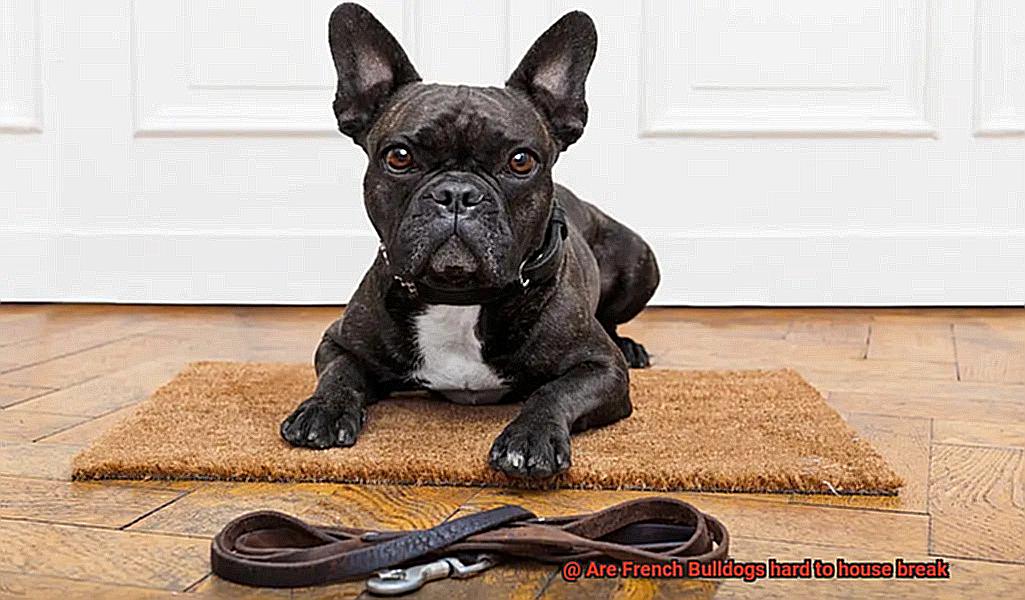Are French Bulldogs hard to house break?
These little bundles of joy have stolen the hearts of dog lovers everywhere with their adorable looks and unique personalities. But amidst all the cuteness, there’s one burning question that prospective owners can’t help but ask: Are French Bulldogs hard to housebreak?
In this blog post, we’re going to dive deep into the art of housebreaking this beloved breed. We’ll mix casual observations with expert insights to unravel the mysteries surrounding their potty training journey. Get ready to explore their quirks, instincts, and the challenges that come along with bringing a French Bulldog into your home.
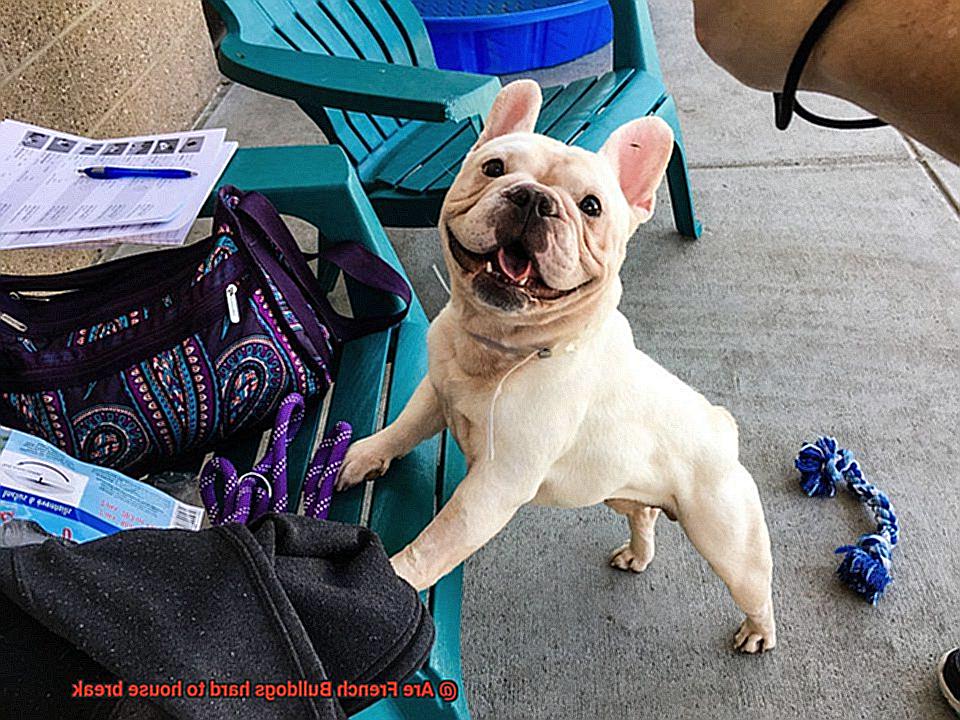
French Bulldogs have an intriguing history as companions to lace makers in France. But even though they’ve come a long way from holding batons, certain biological factors can make housebreaking a bit more challenging. So get ready for an adventure as we explore their curious nature, determination (or stubbornness.), and unique physical attributes that play a significant role in their housebreaking journey.
Join us as we shine a light on why consistent routines, positive reinforcement, and patience are vital ingredients in training these lovable pups. Whether you’re about to become a French Bulldog parent or simply interested in dog training, this comprehensive guide aims to demystify the challenges of housebreaking these charming companions. Discover the secrets to success, debunk common myths, and gain practical strategies for turning your French Bulldog into a well-behaved member of your household.
So buckle up for a tail-wagging adventure as we unveil the hurdles faced by French Bulldogs during housebreaking. From potty pads to puppy-proofing, this guide will equip you with knowledge and insights necessary for building a strong bond with your furry friend while overcoming any obstacles that may arise.
Stay tuned for future posts where we’ll delve into specific training techniques, troubleshooting tips, and success stories shared by experienced French Bulldog owners. Let’s debunk the myth that housebreaking a French Bulldog is an insurmountable task and celebrate the joy and satisfaction that comes with a clean and well-trained home.
Disclaimer: The views and tips shared in this blog post are based on general observations and personal experiences. Always consult a professional trainer or veterinarian for personalized advice.
The Stubborn Streak of French Bulldogs
Contents
- 1 The Stubborn Streak of French Bulldogs
- 2 Small Bladder Capacity: A Challenge for Housebreaking
- 3 Temperature Sensitivity and the Housebreaking Process
- 4 Establishing a Routine is Key to Successful Housebreaking
- 5 Positive Reinforcement Techniques for Training French Bulldogs
- 6 Utilizing a Crate or Designated Area for Unsupervised Time
- 7 Overcoming Challenges and Establishing Good Habits
- 8 Common Mistakes When Housebreaking French Bulldogs
- 9 Conclusion
French Bulldogs are adorable, playful, and full of personality. However, they also have a reputation for being stubborn, which can make housebreaking a challenge for their owners. In this article, we’ll explore the stubborn streak of French Bulldogs and provide some tips to help you successfully housebreak your furry friend.
Understanding the Stubborn Streak:
French Bulldogs have an independent nature and a strong will, which contributes to their stubborn streak. They may resist following commands or instructions, making it difficult to train them to use the bathroom outside. This stubbornness, combined with their small bladder capacity and sensitivity to extreme temperatures, can complicate the housebreaking process.
Be Patient and Consistent:
Patience is key when housebreaking a French Bulldog. They may take longer to learn compared to other breeds, so it’s important not to get discouraged. Consistency is also crucial – establish a routine and stick to it. Take your Frenchie outside at regular intervals throughout the day, including after meals and naps.
Use Positive Reinforcement:
French Bulldogs respond well to positive reinforcement techniques. When your Frenchie eliminates outside, reward them with treats, praise, or playtime. This positive association will encourage them to continue using the appropriate spot for elimination.
Crate Training:
Consider crate training as part of your housebreaking strategy. French Bulldogs naturally avoid soiling their sleeping areas, so keeping them confined to a crate or designated area when unsupervised can help prevent accidents and reinforce good bathroom habits.
Seek Professional Assistance:
If you’re struggling with housebreaking your French Bulldog, don’t hesitate to seek professional training assistance or utilize resources such as books or online tutorials. An experienced trainer can provide guidance tailored to your Frenchie’s specific needs.
Small Bladder Capacity: A Challenge for Housebreaking

Housebreaking a French Bulldog can be challenging, especially considering their relatively small bladder capacity. However, with consistency and patience, you can overcome this obstacle and successfully train your furry friend. In this blog post, we will explore why consistency and patience are key when housebreaking a French Bulldog with a small bladder capacity, and provide you with practical tips to make the process easier.
Understanding the Challenge:
French Bulldogs have a smaller bladder capacity compared to other breeds, typically around 10 to 12 ounces. This means they need to urinate more frequently than larger dogs. Understanding this limitation is crucial for successful housebreaking.
The Power of Consistency:
Consistency is the cornerstone of effective housebreaking. By establishing a routine and sticking to it, you will help your French Bulldog understand where and when they should go potty. Here’s how you can achieve consistency:
- Set a Schedule: Create a regular schedule for bathroom breaks, including first thing in the morning, after meals, before bedtime, and throughout the day. Consistently taking your Frenchie out at these times will help them develop good habits.
- Use Commands: Introduce specific commands like “go potty” or “do your business.” By using these commands consistently, your French Bulldog will associate them with the act of going potty.
- Designated Potty Area: Designate a specific area outside for your Frenchie to do their business. This will help them associate that spot with going potty and reduce confusion.

Patience Pays Off:
Housebreaking takes time and patience. Accidents may happen, but it’s important not to scold or punish your Frenchie. Instead, focus on positive reinforcement:
- Praise and Rewards: When your French Bulldog successfully goes potty outside, praise them enthusiastically and offer treats. Positive reinforcement will motivate them to repeat the behavior.
- No Punishment: Avoid scolding or punishing your Frenchie for accidents. This can create anxiety and hinder the housebreaking process. Instead, focus on redirecting their behavior to the desired outcome.
- Supervision and Confinement: When you cannot supervise your Frenchie, confine them to a crate or use baby gates to limit their access to the house. This will prevent accidents and help them develop bladder control.
Temperature Sensitivity and the Housebreaking Process
French Bulldogs are known for their adorable wrinkled faces and affectionate nature. However, they are also sensitive to extreme temperatures, which can impact the housebreaking process. Let’s explore how temperature sensitivity plays a role in successfully housebreaking French Bulldogs.
Hot Weather Challenges
In scorching temperatures, French Bulldogs can quickly become overheated, making it difficult for them to hold their bladder or bowel movements. To combat this, provide a cool and shaded area for your furry friend, especially when they are left alone for extended periods. Consider using pee pads or indoor doggy toilets as a convenient alternative during heatwaves.
Cold Weather Concerns
French Bulldogs may be reluctant to go outside in cold weather due to their short coats and lack of body fat. Create a warm and comfortable environment both indoors and outdoors. Consider using warm blankets or jackets to keep them cozy during potty breaks. Again, indoor doggy toilets can be a helpful solution when the weather is particularly chilly.
Consistency and Patience Are Key
Regardless of the temperature, consistency and patience are crucial in the housebreaking process. Take your French Bulldog outside regularly and reward them for successful bathroom breaks. Monitor the temperature inside your home and make necessary adjustments to keep it comfortable for your pup.
Seek Professional Guidance
If you’re struggling with temperature sensitivity during the housebreaking process, consult with a veterinarian or professional dog trainer. They can provide valuable guidance tailored to your specific situation.
Establishing a Routine is Key to Successful Housebreaking
Housebreaking a French Bulldog can be a challenging task, but with the right approach and consistency, it can be accomplished successfully. In this blog post, we will explore why establishing a routine is crucial for housebreaking your French Bulldog and provide you with practical tips to make the process easier.
Consistency is Key:
Consistency is the foundation of successful housebreaking for any dog, including French Bulldogs. By establishing a routine, you provide your furry friend with a sense of structure and predictability, making it easier for them to understand what is expected of them.
Designated Potty Area:
Create a designated potty area for your French Bulldog either outdoors or indoors on a pee pad. This designated spot will help them associate that area with going potty, making it easier for them to understand where they should eliminate.

Regular Potty Breaks:
Take your French Bulldog to the designated potty area at regular intervals throughout the day. Schedule potty breaks after meals, naps, playtime, and waking up in the morning or after a nap. This consistency will reinforce good habits and minimize accidents indoors.
Use a Command or Cue:
Use a specific command or cue to signal to your French Bulldog that it’s time to go potty. Choose simple phrases like “go potty” or “do your business.” Consistently using the same command will help them associate it with the desired behavior.
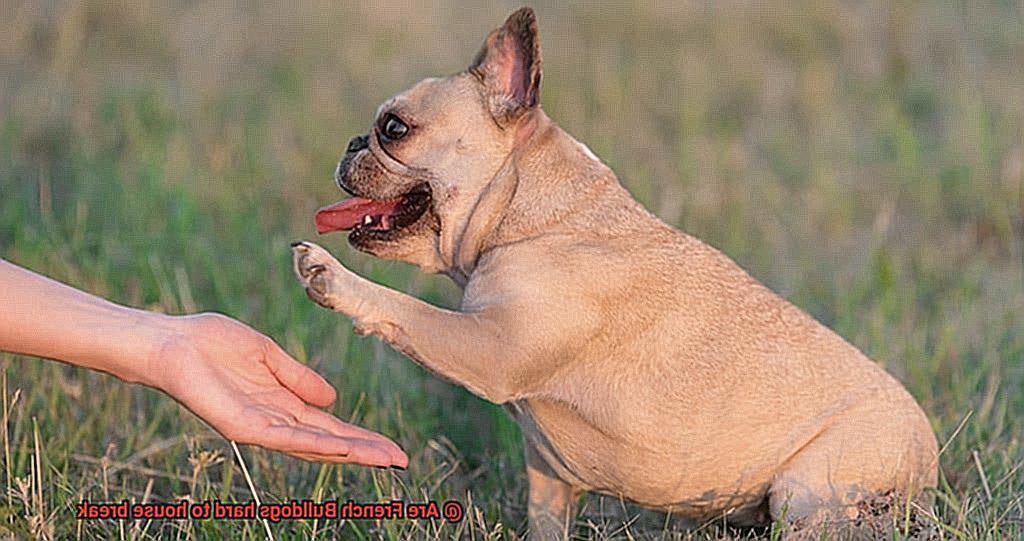
Patience and Positive Reinforcement:

Be patient and give your French Bulldog enough time to eliminate in the designated area. It may take a few minutes for them to get into the right mindset. When they successfully go potty in the designated spot, reward them with praise, treats, or playtime. Positive reinforcement will strengthen the desired behavior.
Consistent Feeding and Watering Schedule:
Establish regular mealtimes for your French Bulldog. By having consistent feeding and watering schedules, you can predict when they may need to relieve themselves. This will help you plan their potty breaks accordingly.
Watch for Behavioral Cues:
Pay attention to your French Bulldog’s behavior and body language. Signs such as circling, sniffing around, or pacing may indicate that they need to go potty. By being observant, you can anticipate their needs and prevent accidents indoors.
Supervision and Confinement:
During the housebreaking process, it’s essential to supervise your French Bulldog closely. If you are unable to keep an eye on them, confine them to a smaller, secure area or utilize a crate. This will prevent accidents and promote success in their housebreaking journey.
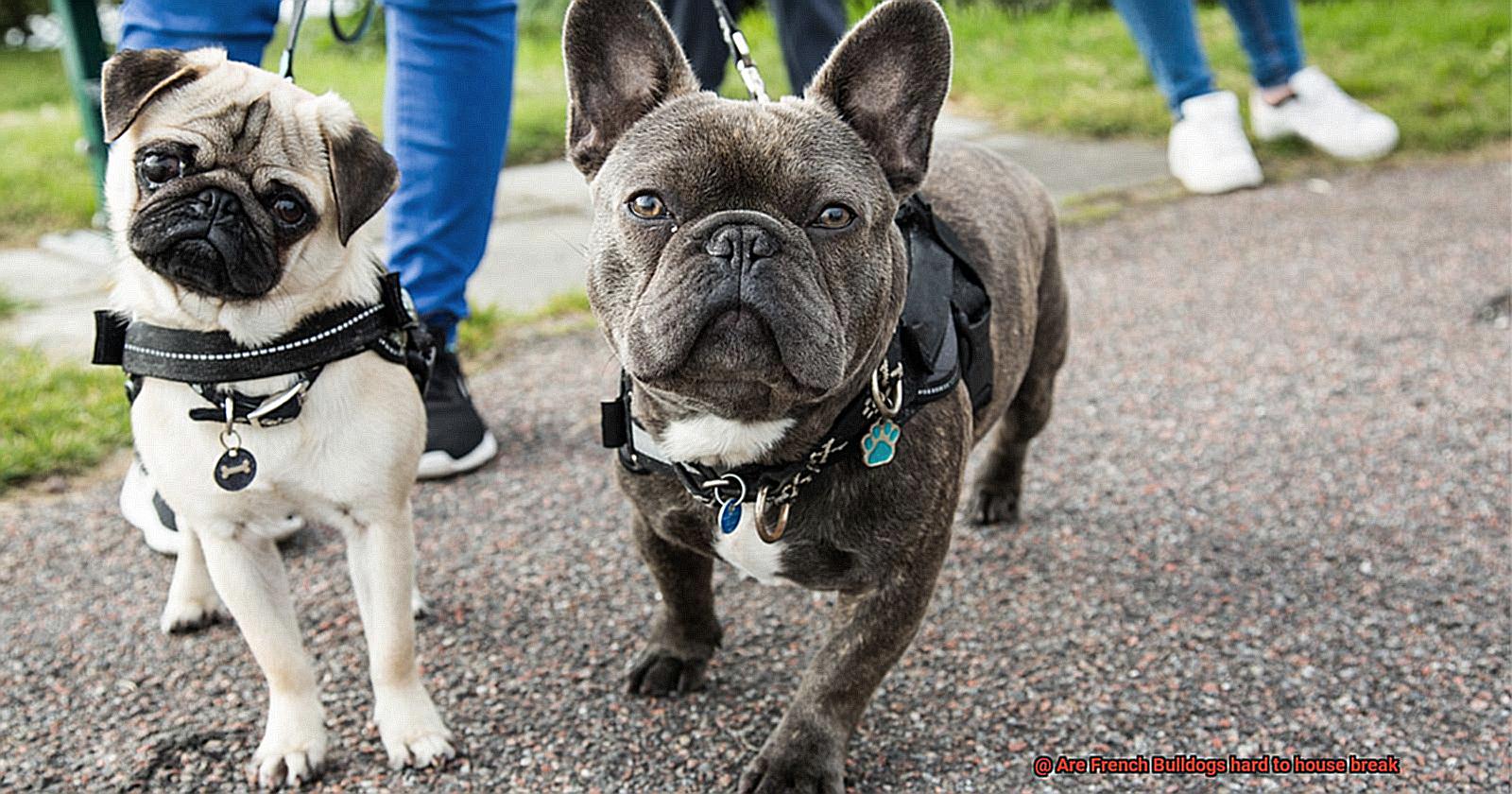
Positive Reinforcement Techniques for Training French Bulldogs
Training a French Bulldog can be a rewarding experience, but it requires the right techniques to ensure success. Positive reinforcement is a highly effective approach that motivates and encourages desired behaviors through the use of rewards. In this blog post, we will explore the importance of positive reinforcement techniques and provide practical tips for training your French Bulldog.
Understanding the Benefits of Positive Reinforcement:
- French Bulldogs are intelligent and eager to please, making them highly responsive to positive reinforcement.
- Positive reinforcement builds a strong bond between you and your dog based on trust and mutual respect.
- It promotes a positive learning environment, free from fear or anxiety, which enhances your dog’s overall well-being.
Choosing the Right Rewards:
- Rewards should be highly motivating for your French Bulldog, such as treats, praise, or playtime.
- Use rewards that are specific to training sessions, ensuring they are only given when your dog displays the desired behavior.
- Experiment with different rewards to find what works best for your individual dog.
Timing is Key:
- Provide rewards immediately after your dog exhibits the desired behavior to reinforce the association between the behavior and the reward.
- Delayed rewards may confuse your dog and hinder their understanding of what they are being rewarded for.
Consistency:
- Consistently reward your French Bulldog for exhibiting the desired behavior and ignore or redirect any unwanted behaviors.
- Use consistent verbal or hand signals during training to help your dog understand what you want them to do.
Start Simple and Progress Gradually:
- Begin with simple commands or behaviors and gradually increase the difficulty level as your dog becomes more proficient.
- Breaking down complex behaviors into smaller steps makes learning easier for your dog and prevents them from becoming overwhelmed.
Short and Engaging Training Sessions:
- French Bulldogs have short attention spans, so keep training sessions brief and enjoyable.
- End each session on a positive note, rewarding your dog for successful behavior and leaving them excited for the next training session.
Utilizing a Crate or Designated Area for Unsupervised Time
If so, crate training can be an invaluable tool in your training arsenal. Not only does it aid in housebreaking, but it also satisfies their natural denning instincts. In this article, we will explore how to effectively utilize a crate or designated area for unsupervised time with your French Bulldog puppy.
Creating a Safe and Comfortable Space:
To start, select a crate that is appropriately sized for your growing pup. It should provide enough room for them to stand, turn around, and lie down comfortably. Make the crate inviting by placing soft bedding, toys, and treats inside. This sets the stage for a positive association with their designated area.

Gradual Introduction:
Begin by introducing your French Bulldog puppy to the crate in short increments of time. Allow them to explore and get accustomed to its presence. Gradually increase the duration, ensuring they have had an opportunity to eliminate before being confined. Remember, patience is key.
Establishing Routine:
Utilize a feeding and bathroom break schedule to establish a routine. Consistency is essential in helping your puppy understand when it’s time to go outside. This routine also aids in minimizing accidents and instills good habits.
Supervision is Key:
Even with crate training, supervision during unsupervised time is crucial. Accidents can still occur, so regularly monitor your puppy’s behavior and provide necessary bathroom breaks. This ensures their well-being and reinforces their training progress.
Avoid Using the Crate as Punishment:
Never use the crate as a form of punishment. Doing so can create negative associations, making it challenging to maintain their positive perception of the space. Instead, the crate should be seen as a safe haven where they can retreat when needing downtime.
Conclusion:
Utilizing a crate or designated area for unsupervised time with your French Bulldog puppy offers numerous benefits. It aids in housebreaking, satisfies their natural instincts, and provides a secure and comfortable space. Remember, consistency, patience, and positive reinforcement are the keys to successful crate training. Embrace this approach, and you’ll soon witness the positive impact it has on your furry friend’s development.
Overcoming Challenges and Establishing Good Habits
Housebreaking any dog can be a challenging task, but French Bulldogs have their own unique set of characteristics that may make the process a bit more difficult. In this section, we will explore the challenges that come with housebreaking French Bulldogs and discuss effective strategies to overcome them. With patience, consistency, and positive reinforcement techniques, you can establish good habits and successfully housebreak your French Bulldog.
Understand and Address Stubbornness:
French Bulldogs are known for their stubbornness and independent thinking. Traditional training methods may not always be effective with them. To overcome this challenge:
- Use positive reinforcement techniques such as treats, praise, and playtime to motivate your French Bulldog.
- Be patient and consistent in your training approach.
- Find training methods that work well with their personality traits, such as clicker training or reward-based training.
Manage Small Bladder Size:
French Bulldogs have small bladders, which means they will need frequent bathroom breaks. To address this challenge:
- Set a routine for your French Bulldog by taking them outside at regular intervals throughout the day.
- Be proactive and take them outside immediately after waking up, eating, drinking, or playing.
- Monitor their water intake to avoid excessive urination.
Address Health Issues:
French Bulldogs are prone to certain health issues that can affect their ability to hold their bladder effectively. To ensure successful housebreaking:
- Keep an eye on their overall health and address any underlying medical conditions promptly.
- Consult with your veterinarian if you notice any signs of urinary tract infections or bladder stones.
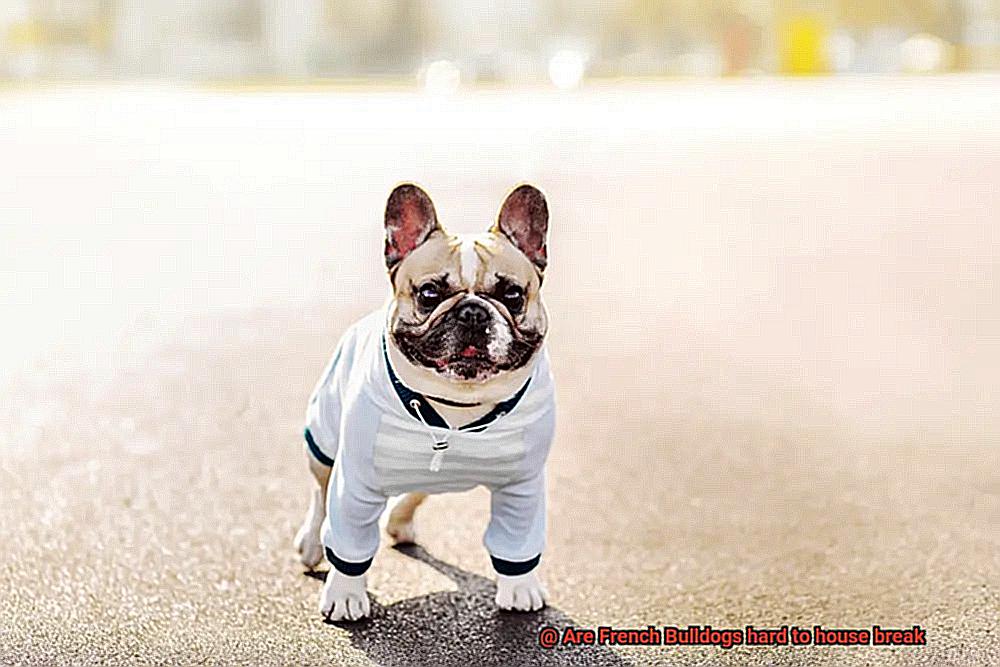
Designated Potty Area:
Creating a designated potty area for your French Bulldog helps establish good habits. Here’s how:
- Choose a specific spot in your yard or designate an area on the balcony if you live in an apartment.
- Consistently take your French Bulldog to this spot when it’s time for bathroom breaks.
- Use verbal cues or commands to reinforce the association between the spot and bathroom breaks.
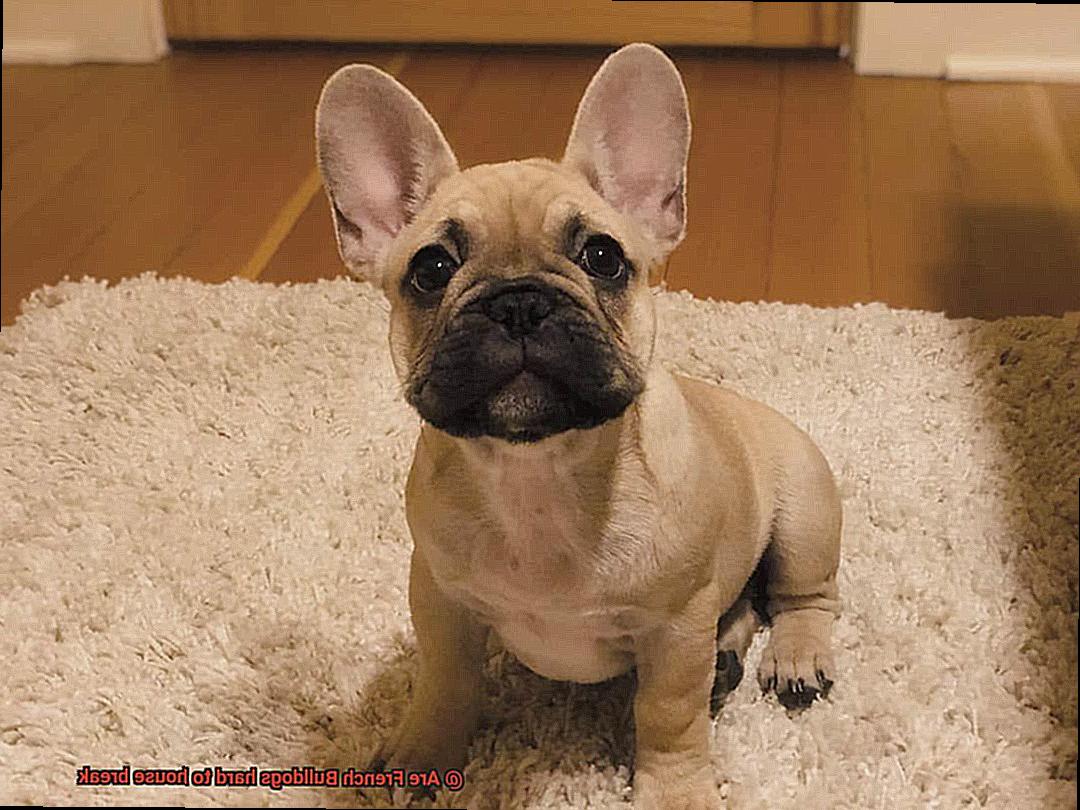
Provide Supervision:
Keeping a close eye on your French Bulldog is crucial during the housebreaking process. Here’s how to ensure effective supervision:
- Watch for signs that your French Bulldog needs to go outside, such as restlessness, sniffing, or circling.
- If you cannot supervise them directly, confine them to a small, puppy-proofed area to minimize accidents.
Common Mistakes When Housebreaking French Bulldogs
Housebreaking a French Bulldog can be a daunting task, but with the right approach and avoiding common mistakes, you can set your furry friend up for success. In this blog post, we will dive into the most common mistakes that owners make when housebreaking their French Bulldogs and provide expert advice on how to avoid them. By following these tips, you can ensure a smoother and more successful housebreaking process.
Lack of Consistency:

Consistency is crucial when it comes to housebreaking any dog breed, including French Bulldogs. Establish a routine for feeding, walking, and potty breaks, and stick to it every day. This helps your Frenchie understand what is expected of them and reduces confusion. Remember, consistency is key to reinforcing good habits.
Punishing Accidents:
Accidents are a normal part of the housebreaking process, especially with puppies. Punishing your French Bulldog for accidents can create fear and anxiety, hindering the training process. Instead, focus on positive reinforcement by rewarding good behavior and redirecting them to the appropriate place to eliminate.
Not Supervising Enough:
Proper supervision is essential during the early stages of housebreaking. Giving your French Bulldog too much freedom too soon can lead to accidents. Utilize baby gates or crates to confine them to a smaller area where accidents can be easily managed and prevented. As they progress, gradually increase their freedom.
Inadequate Crate Training:
Crate training can be an effective tool for housebreaking French Bulldogs if done correctly. Avoid using the crate as punishment or leaving your Frenchie in it for extended periods. Instead, make the crate a positive and comfortable space by using positive reinforcement techniques. Gradually increase the time spent in the crate to help them associate it with positive experiences.
Neglecting Proper Cleaning:
Accidents happen, but neglecting to properly clean them can lead to repeat offenses. Use enzymatic cleaners specifically designed for pet messes to eliminate lingering odors that may attract your French Bulldog back to the same spot. Thoroughly clean the area to prevent future accidents in the same location.
Giving Up Too Soon:
Housebreaking takes time and patience. Don’t expect your French Bulldog to be fully trained overnight. Each dog is unique and may require different approaches or techniques. Stay consistent, provide positive reinforcement, and be patient. With time, your Frenchie will develop good habits and become a well-trained companion.
tH991oUcmis” >
Conclusion
In conclusion, French Bulldogs can present some challenges when it comes to housebreaking.
However, with consistent training, patience, and a positive attitude, you can successfully teach them proper bathroom etiquette. It’s important to establish a routine and reward good behavior to encourage them to learn quickly.
French Bulldogs are intelligent and eager to please, so with time and effort, you’ll be able to enjoy a well-trained and housebroken furry companion.
